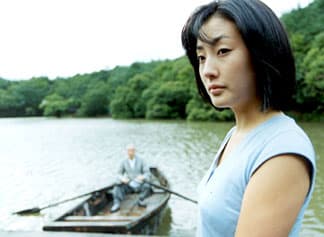A man's life told through a series of seasonal glimpses stretched across many years, Kim Ki-duk's gentle Spring, Summer, Fall, Winter
and Spring is a bittersweet, quiet prod at the examined life. Tracing the life of a young monk from boyhood to adulthood on a serene island monastery sort of a Buddhist pontoon boat under the tutelage of an older monk, Spring, Summer manages to be both lush and spare at the same time.
The stillness of their world talking is infrequent and interference from the world of men even more so is warmed and tempered by the livelihood and relative normalcy of the natural world that surrounds them. Yet that detachment from the world of men, while a choice for the older monk, wasn't a choice his younger apprentice was afforded, and when confronted with the offerings of modern civilisation (namely women), the younger man begins to yearn for a more earthly fulfilment. Demonstrating an utter lack of courtship skills, our youthful hero manages to get the girl and skip into town, but this wouldn't be a tale about innocence without tragic, irrevocable loss, and it is only a symbolic season later that he returns to face his shame and rebuild.
Kim's peaceful story contains a polarising question about monastery life: can human nature truly flourish spiritually in an environment where man's baser instincts, without the framework of society's tests, grow unchecked? Under the influence of natural desires and disappointments, the two men play out a cycle of retaliation and punishment, both to each other and to themselves, illuminating the turmoil of the inner world even among the most tranquil surroundings. (Mongrel Media)
The stillness of their world talking is infrequent and interference from the world of men even more so is warmed and tempered by the livelihood and relative normalcy of the natural world that surrounds them. Yet that detachment from the world of men, while a choice for the older monk, wasn't a choice his younger apprentice was afforded, and when confronted with the offerings of modern civilisation (namely women), the younger man begins to yearn for a more earthly fulfilment. Demonstrating an utter lack of courtship skills, our youthful hero manages to get the girl and skip into town, but this wouldn't be a tale about innocence without tragic, irrevocable loss, and it is only a symbolic season later that he returns to face his shame and rebuild.
Kim's peaceful story contains a polarising question about monastery life: can human nature truly flourish spiritually in an environment where man's baser instincts, without the framework of society's tests, grow unchecked? Under the influence of natural desires and disappointments, the two men play out a cycle of retaliation and punishment, both to each other and to themselves, illuminating the turmoil of the inner world even among the most tranquil surroundings. (Mongrel Media)
